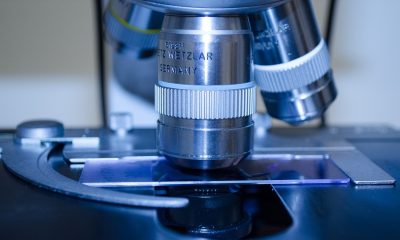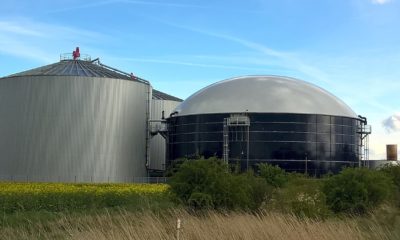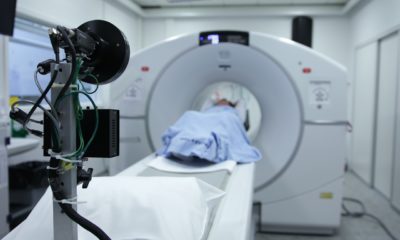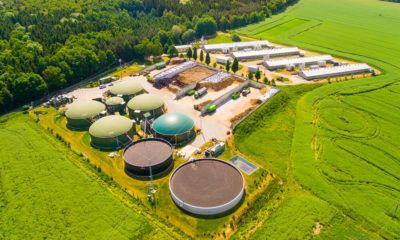Featured
Spanish Government to Promote Biogas to Reduce Energy Dependence
Renewable gases (green hydrogen and biogas), together with photovoltaics and wind power, are the energy pillars on which the European bioeconomy will develop in the coming decades, as they will make it possible to replace the use of fossil fuels even in those sectors where electrification is not feasible to achieve a carbon-neutral future. With the Hydrogen Roadmap the Government began the deployment of the sector.

After the economic crisis of 2008, and, especially, the one caused 12 years later by the coronavirus, the European Union has redoubled its commitment to reduce energy and industrial dependence on hydrocarbon-producing countries and to encourage its own production. The war that broke out in Ukraine last February only confirmed the need to take a firm step towards energy independence, focusing on the decarbonization and circularity of the economic system in order to minimize the effects of global warming. But it is not easy, nor can it be done overnight.
Find more about the promotion of biogas by the Spanish Government and read the latest economic news of the day with the Born2Invest mobile app.
With the Hydrogen Roadmap, approved in October 2020, the Government began the deployment of this incipient sector
Renewable gases (green hydrogen and biogas), together with photovoltaics and wind power, are the energy pillars on which the European bioeconomy will develop in the coming decades, as they will make it possible to replace the use of fossil fuels even in those sectors where electrification is not feasible to achieve a carbon-neutral future.
In addition to the environmental advantages, harnessing the potential of renewable gases in Spain will bring a set of benefits that will help reduce energy dependence, strengthen the circular economy, and fix the rural population thanks to the growth of its broad business value chain.
With the Hydrogen Roadmap, approved in October 2020, the Government began the deployment of this incipient sector, which last March 22nd took a new step with the activation of the Biogas Roadmap, a document that identifies the challenges and opportunities of this energy source and proposes to multiply by 3.8 its production until 2030, exceeding 10.4 TWh. It will also make it possible to avoid the emission into the atmosphere of approximately 2.1 million tons of CO2 equivalent per year.
Focused on waste recovery, this guide has been designed with the aim of promoting the use of biogas in two main ways: the production of electricity and useful heat -especially for industry- and its use as a sustainable biofuel for mobility. In this sense, a ministerial order is being processed with the regulatory bases to distribute aid for $164.5 million (€150 million).
Guarantees and objectives
In order to boost the biogas market, the Roadmap includes 45 specific measures divided into five lines of action. Firstly, it establishes the creation of a system of guarantees of origin, similar to that of renewable electricity, so that consumers can distinguish biogas from conventional fossil gas, highlighting its renewable origin. It also includes the streamlining and homogenization of administrative procedures and the improvement of waste regulations, to facilitate the obtaining of renewable gas and the subsequent use of the resulting digestate after the anaerobic process, mainly as fertilizer.
The second point highlights the possibility of establishing annual penetration targets for the sale or consumption of biogas, with mandatory quotas; in addition, it is proposed to encourage its production in areas with abundant raw material -where there are livestock farms, agri-food industry, or waste treatment plants-, together with measures to promote on-site consumption, in vehicle fleets, in thermal uses, in hydrogen production, and the substitution in general of gas of fossil origin, provided that it is economically viable.
The text also envisages earmarking existing aid lines to finance innovation and technological development, as well as taking advantage of the boost that the Recovery, Transformation and Resilience Plan (PRTR), which includes aid for biogas, can provide to the sector.
Finally, it plans to promote those projects that demonstrate their use in industry and to promote innovation in less mature technologies, as well as to encourage research to reduce emissions of polluting gases.
__
(Featured image by c1n3ma via Pixabay)
DISCLAIMER: This article was written by a third party contributor and does not reflect the opinion of Born2Invest, its management, staff or its associates. Please review our disclaimer for more information.
This article may include forward-looking statements. These forward-looking statements generally are identified by the words “believe,” “project,” “estimate,” “become,” “plan,” “will,” and similar expressions. These forward-looking statements involve known and unknown risks as well as uncertainties, including those discussed in the following cautionary statements and elsewhere in this article and on this site. Although the Company may believe that its expectations are based on reasonable assumptions, the actual results that the Company may achieve may differ materially from any forward-looking statements, which reflect the opinions of the management of the Company only as of the date hereof. Additionally, please make sure to read these important disclosures.
First published in elEconomista.es, a third-party contributor translated and adapted the article from the original. In case of discrepancy, the original will prevail.
Although we made reasonable efforts to provide accurate translations, some parts may be incorrect. Born2Invest assumes no responsibility for errors, omissions or ambiguities in the translations provided on this website. Any person or entity relying on translated content does so at their own risk. Born2Invest is not responsible for losses caused by such reliance on the accuracy or reliability of translated information. If you wish to report an error or inaccuracy in the translation, we encourage you to contact us.

-

 Cannabis7 days ago
Cannabis7 days agoRecord-Breaking Mary Jane Fair in Berlin Highlights Cannabis Boom Amid Political Uncertainty
-

 Impact Investing2 weeks ago
Impact Investing2 weeks agoGlobal Gender Gap Progress Slows Amid Persistent Inequality and Emerging Risks
-

 Biotech4 days ago
Biotech4 days agoVytrus Biotech Marks Historic 2024 with Sustainability Milestones and 35% Revenue Growth
-

 Crowdfunding2 weeks ago
Crowdfunding2 weeks agoColombia Approves Terrenta’s Crowdfunding Platform for Real Estate Financing





















